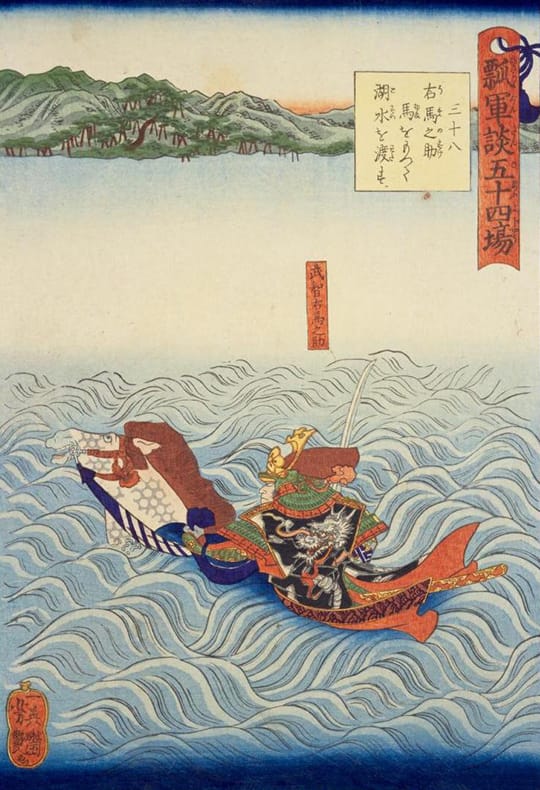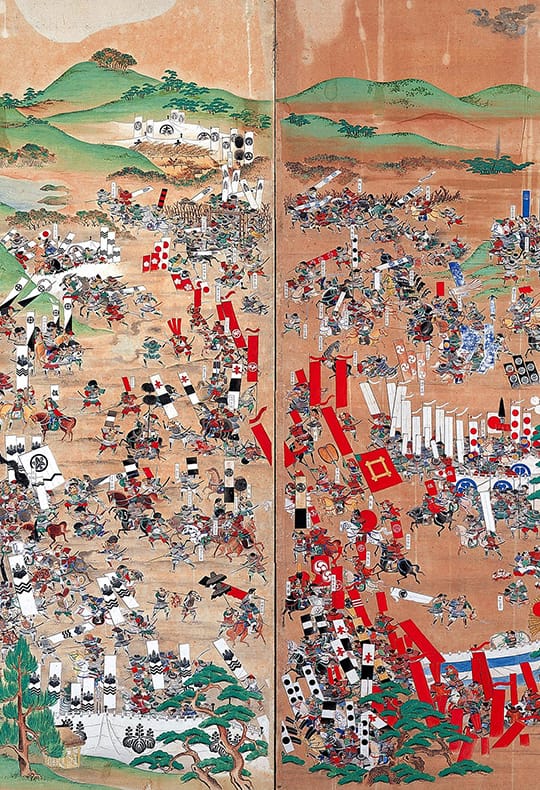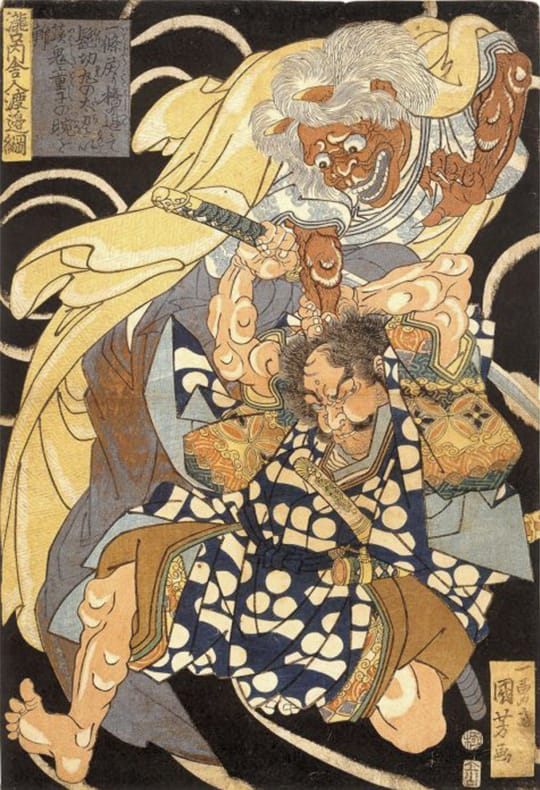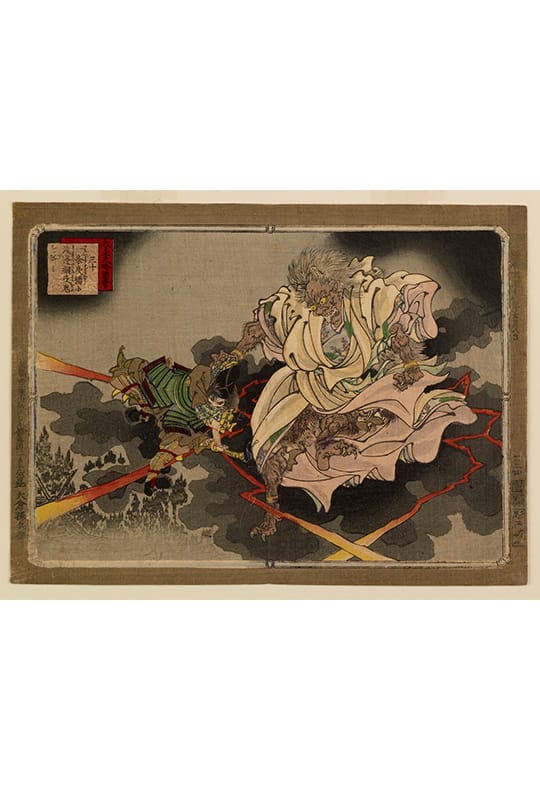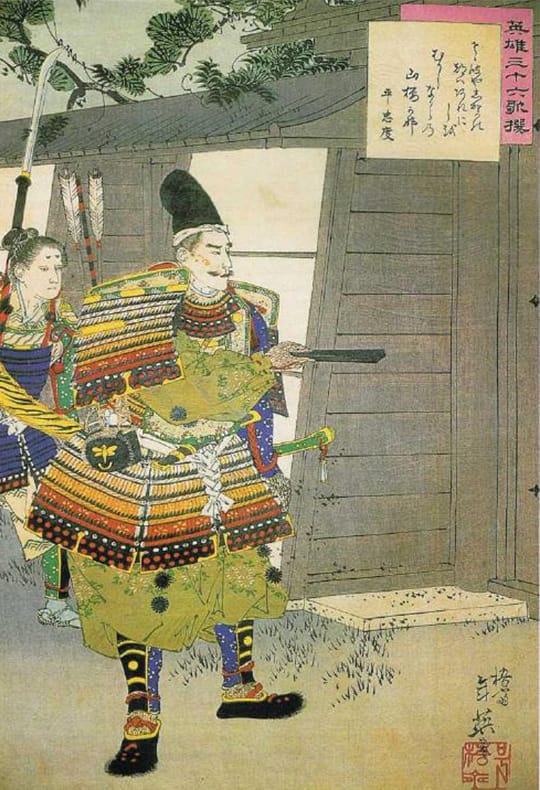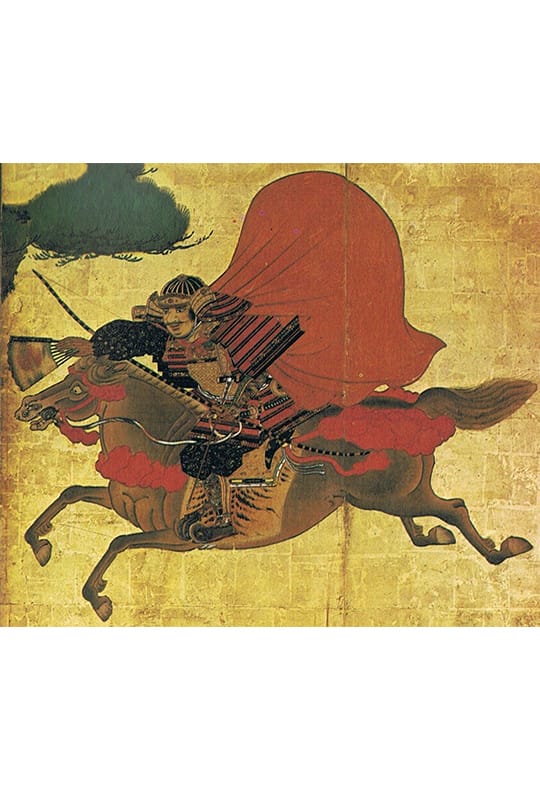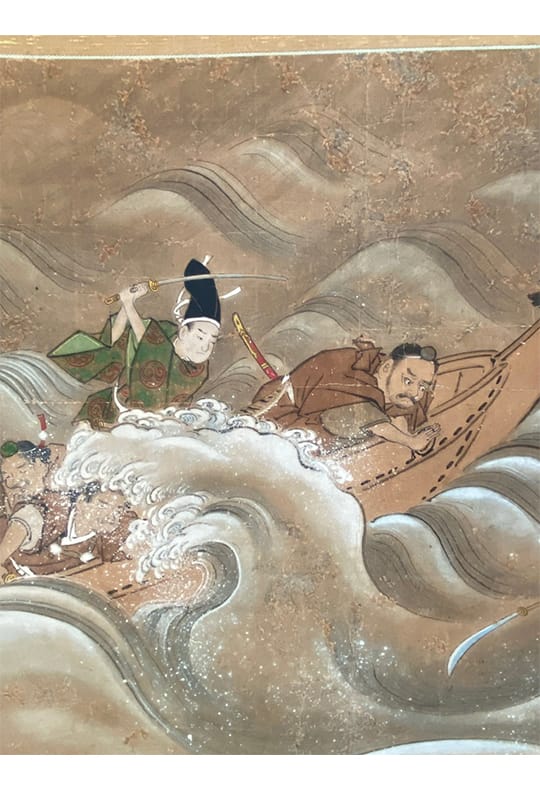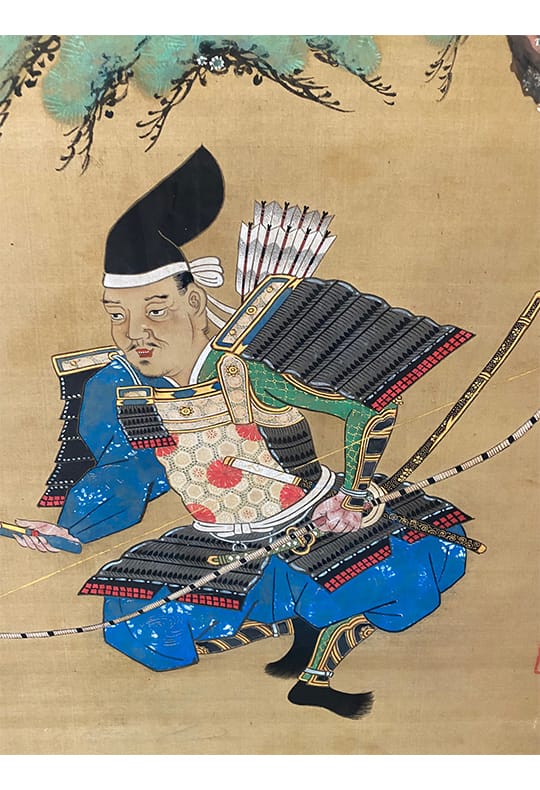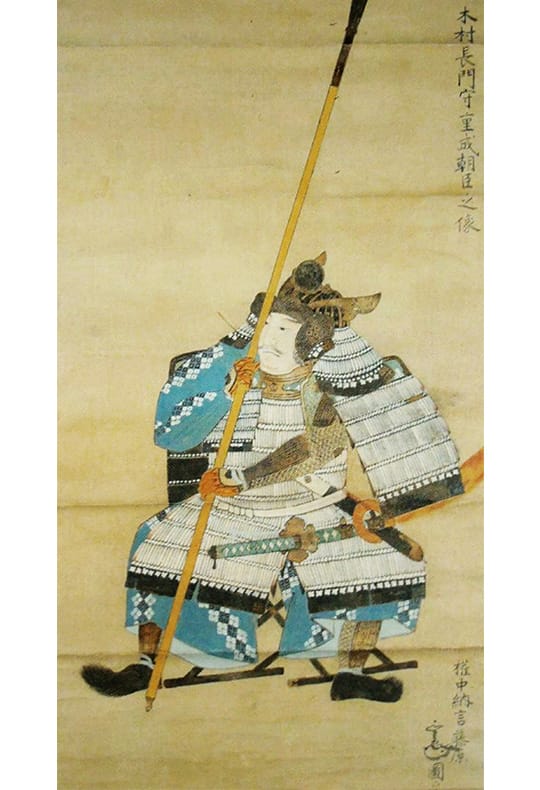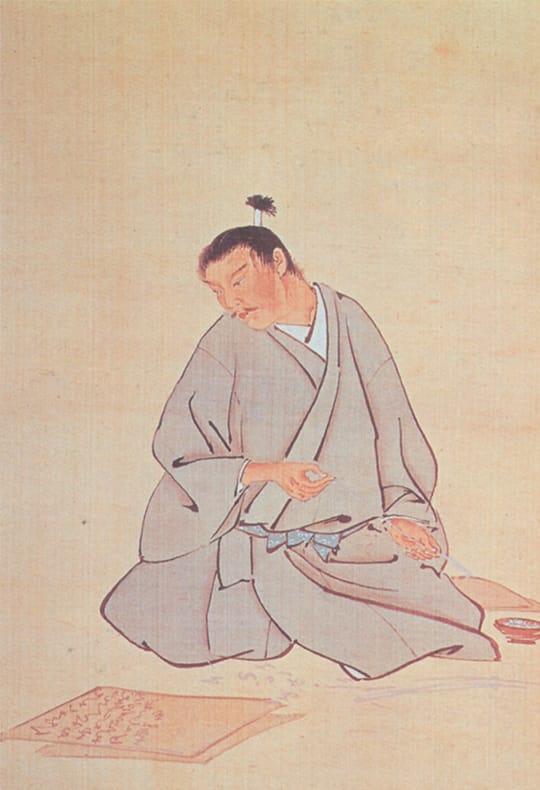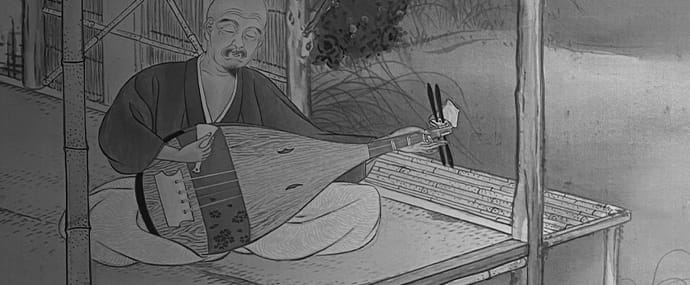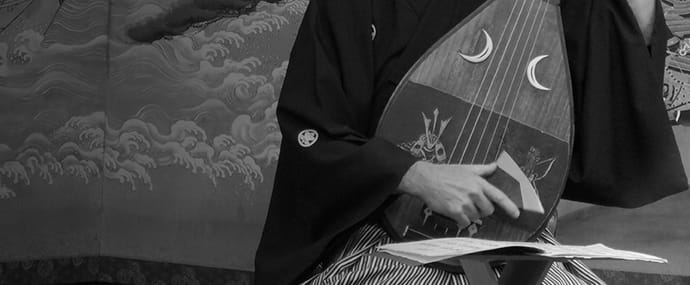Kyoto-search

honnoji
本能寺
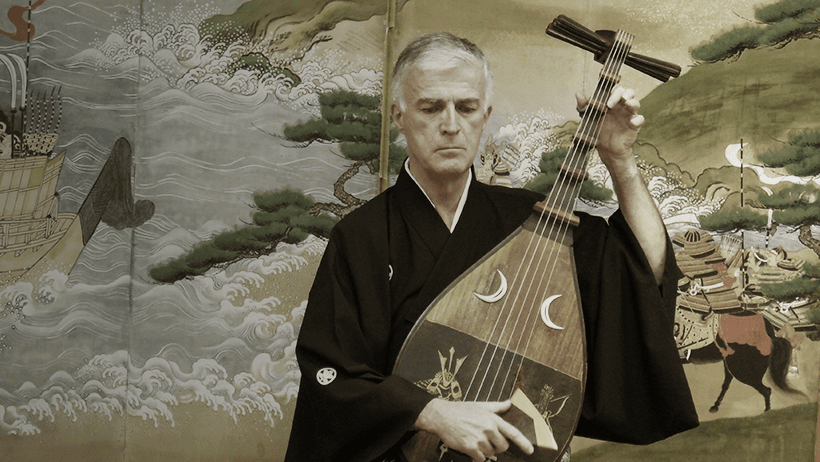
Introduction
Honnōji is the name of a temple in Kyoto where AKECHI Mitsuhide and his troops attacked and destroyed the shogun, ODA Nobunaga and one hundred of his closest retainers on the 21st of June 1582. AKECHI’s uprising against his liege lord is one of the best-known stories from the Warring States period.
The main purpose of the many military struggles in the late 16th century was to unify the country. ODA Nobunaga was the first of three generals who attempted this. TOYOTOMI Hideyoshi also sought to unify the country, but it was only the third, TOKUGAWA Ieyasu, who actually achieved this goal and established a hereditary feudal state that then lasted approximately two hundred fifty years, until 1867. While all three of these generals are mentioned in this ballad, AKECHI Mitsuhide, who crushed Nobunaga at Honnōji, is nevertheless the central figure.
There are numerous Edo-period (1603-1867) accounts in literature and the performing arts of this incident, the most popular of which were TAKEUCHI Kakusai’s (active late 18th century) Ehon taikōki, compiled 1797-1801, and two works by Rai San’yō (1781-1832), Nihon gaishi (1836) and the Nihon gafu (1830). These sources were still widely known in the Meiji and Taishō periods (1868-1926), when this ballad Honnōji was written, and lines 65-72 are a citation of a poem in classical Chinese by RAI San’yō, also entitled Honnōji, in the Nihon gafu.
From what historical documents remain, the reasons and motives behind Mitsuhide’s insurgence are unclear. In fictional literature, however, the suggestion is that the insults and offenses Mitsuhide endured — many of them are mentioned in this ballad – were reason enough for him to stand against Nobunaga.
Synopsis
In 1582, ODA Nobunaga presented TOKUGAWA Ieyasu with a fief, after which Ieyasu visited the Azuchi castle to express his gratitude. To receive such an important guest, a sumptuous banquet was arranged, perhaps too sumptuous for Ieyasu. Nobunaga blamed AKECHI Mitsuhide, a well-educated retainer with a perfect knowledge of etiquette, for the unforgivable error of excess. As a reprimand, Nobunaga ordered AKECHI to reinforce TOYOTOMI Hideyoshi, who needed assistance in his fight against the troops of the MŌRI clan in Bitchū. This forced service under the command of Hideyoshi was only one of the many humiliations Mitsuhide supposedly had to endure from Nobunaga.
When Nobunaga moved to Kyoto with only one hundred some close retainers, Mitsuhide felt that his chance for revenge had come. Initially following Nobunaga’s orders, Mistuhide led his troops towards Bitchū, but once west of Kyoto, on Mt Ōeyama’s Oinosaka Pass, he changed direction and rode eastwards towards Kyoto. Only at this point did his warriors recognize the hidden plan. “My enemy is in Honnōji,” (line 71) said Mitsuhide, by which he announced his rebellion. Unconcerned with whom they fought, his warriors followed him without question, and in the early hours of June 21st 1582, Mitsuhide attacked Honnōji, where Nobunaga was resting with his men.
Nobunaga heard the battle cries and ordered his page, Ranmaru, to assess the situation. Ranmaru climbed a pine tree and saw white flags with the bellflower crest. “Mitsuhide has started a rebellion,” he shouted, and, soon, Mitsuhide’s men filled the temple. Nobunaga fought fiercely, but soon suffered a wound on his left arm. When he recognized that he had no chance of surviving, he retired to the temple lodging and set fire to the compound. Most of Nobunaga’s men perished in the flames with their lord.

Lyrics
-
1. During the Civil War, chaotic as hemp fibers, In einem Bürgerkrieg, so wirr wie Hanf,
Asa to midaruru sengoku no 麻と乱るゝ戦国の
-
2. people, one and all, denkt jeder nur an seine Pflicht –
hito to shi ieba tare mo ka mo 人とし言へば誰もかも
-
3. fed horses, trained warriors, es füttert jeder seine Pferde, drillt die Mannschaft,
uma o yashinai hei o neri 馬を養ひ兵を練り
-
4. stored provisions, and polished swords. sorgt für Vorrat, pflegt sein Schwert.
kate o osamete ken o masu 糧を収めて剣を磨す
-
5. It was summer, the fifth month of 1582, Im Sommer war’s, im fünften Monat 1582,
koro wa Tenshō jūnen natsu gogatsu 頃は天正十年夏五月
-
6. when TOKUGAWA Ieyasu, presented with a fief, als (Nobunaga)TOKUGAWA Ieyasu ein Lehen schenkte.
TOKUGAWA Ieyasu hōzerare 徳川家康封ぜられ
-
7. went to pay his respects at the castle of Azuchi. Um sich zu bedanken ging Ieyasu in das Schloss von Azuchi.
Azuchi jōka ni irishikaba 安土城下に入りしかば
-
8. The General of the Right, ODA Nobunaga, Der General der Rechten, ODA Nobunaga,
ODA Udaishō Nobunaga wa 織田右大将信長は
-
9. to offer as courteous a welcome as possible, gab sich Mühe, ihn mit Würde zu empfangen
ito teichō ni mukaen to いと鄭重に迎へんと
-
10. immediately commanded KORETŌ Mitsuhide und befahl KORETŌ Mitsuhide
tadachi ni KORETŌ Mitsuhide ni 直に惟任光秀に
-
11. to arrange a splendid banquet. ein glänzendes Bankett zu richten.
kyōō no yaku o zo meizeraru 饗応の役をぞ命ぜらる
-
12. Mitsuhide, receiving this order, Mitsuhide nahm die Order ernst
on‘uke naseshi Mitsuhide wa 御請けなせし光秀は
-
13. despite the troubled times, und schickte sich, trotz harten Zeiten an,
midaretaru yo ni kokoroeshi 乱れたる世に心得し
-
14. nevertheless, wished to display the customs of the Capital. ein Festmahl ganz im Stil der Kaiserstadt zu richten.
miyako no teburi misebaya to 都の手振見せばやと
-
15. It was a felicitous task indeed, Herrlich wurde das Bankett,
sashimo medetaku tsutomeshi o さしも目出度勤めしを
-
16. but spiteful small-minded men said doch kleine Geister krittelten
shōjinbara no gen ni yori 小人輩の言により
-
17. that Akechi had entertained the guest too lavishly. und fanden, Mitsuhide hätte übertrieben.
zenbi kabun no hyō o uke 善美過分の評を受け
-
18. With this, the dark demons of doubt Damit nährten sie auch Hass und Zweifel
gishin anki wa Nobunaga no 疑心暗鬼は信長の
-
19. made their foul nest in Nobunaga’s heart. im Gemüt von Nobunaga.
mune ni yadorishi toki mo toki 胸にやどりし時も時
-
20. When, from Chūgoku, HASHIBA Hideyoshi Als der Feldherr HASHIBA Hideyoshi von Chūgoku her
HASHIBA Hideyoshi Chūgoku yori 羽柴秀吉中国より
-
21. requested troop assistance, Truppen-Unterstützung forderte,
tasuke no hei o koishikaba 援けの兵を請ひしかば
-
22. immediately, a peremptory directive, fiel schnell die Wahl
genmei tachimachi Mitsuhide no 厳命忽ち光秀の
-
23. issued from above, fell on Mitsuhide’s head. auf den Vasallen Mitsuhide,
kōbe no ue ni zo kudarikeru 頭の上にぞ下りける
-
24. In his heart of hearts, Mitsuhide thought, was dieser aber schlecht ertrug:
Mitsuhide hisoka ni omou yō 光秀私かに思ふやう
-
25. “Despite the presence of others, „Trotz vielen anderen, die in Frage kämen,
hito mo aran ni kono ware ni 人もあらんに此の我に
-
26. he has commanded me to follow HASHIBA’s orders. will mein Herr, dass ich mich HASHIBAs Befehlen füge.
HASHIBA ga mei ni shitagae to wa 羽柴が命に従へとは
-
27. How callous my lord can be!” Wie kann nur mein Herr mich so behandeln“,
ana nasakena no waga kimi ya to あな情けなの我君やと
-
28. and ground his teeth in bitterness, klagte er die Zähne knirschend –
hagami o nashite uramishi wa 歯がみをなして恨みしは
-
29. which, for someone in service to a lord, was man nie im Dienste eines Herren
kimi ni tsukōru jinshin no 君に仕ふる人臣の
-
30. is something that should never happen. tun soll.
yomo aru majiki koto naredo よも有るまじき事なれど
-
31. Nevertheless, Nobunaga, Nobunaga hatte mehrmals –
mata Nobunaga o miru toki wa また信長を見る時は
-
32. despite his rank of General of the Right, gar nicht passend für die Stellung eines Generals zur Rechten –
udaishō tomo aogaruru mi ni 右大将とも仰がるゝ身に
-
33. had treated Mitsuhide with extraordinary rudeness. Mitsuhide auf die gröbste Art beleidigt.
sobō no furumai ito ōku 粗暴の振舞いと多く
-
34. Once he had Ranmaru Einmal hieß er Ranmaru, ihn mit einem Eisenfächer
aru toki wa Ranmaru o shite 或時は蘭丸をして
-
35. strike Mitsuhide on the head with an iron fan. auf den Kopf zu schlagen,
Mitsuhide ga kōbe ni tessen o kuwaesase 光秀が頭に鉄扇を加へさせ
-
36. Once he forced him to consume sake, a drink he despised, und ein andermal, da zwang er gar den Abstinenten,
mata aru toki wa konomanu sake o kotosarani 又或時は好まぬ酒を殊更に
-
37. in a fit of obdurate obstinacy. dass er Reiswein trinke.
gai o tōshite susumeshime 我意を通して進めしめ
-
38. Even Mitsuhide’s fief of Shiga he seized, Weiter plante er – nach Ablauf dreier Jahre –
Shiga no miyako no ryōchi sae 志賀の都の領地さへ
-
39. only to present it to MORI Ranmaru after three years, Mitsuhide grundlos in der Stadt Shiga das Lehen wegzunehmen
mitose no uchi ni wa kotonaku mo 三年の内には事なくも
-
40. without the slightest reasoning. und es seinem Pagen Ranmaru zu geben.
ubaikaesan setsu o kiku 奪ひ返さん説を聞く
-
41. And once again, Mitsuhide, spending his own resources Trotz Schikanen solcher Art, bemühte Mitsuhide sich ein zweites Mal,
ima mata san o katamukete 今又産をかたむけて
-
42. to receive the recently arrived Ieyasu, als Ieyasu wieder Azuchi besuchte,
arata ni kitarishi Ieyasu ni 新に来りし家康に
-
43. had his considerate hospitality ihn sogar mit eignen Mitteln zu bewirten.
kokorozukushi no motenashi mo 心づくしの饗応も
-
44. vanish like foam into the waters of Lake Biwa. Aber (sein Gebieter Nobunaga) schmiss die Köstlichkeiten in den Biwasee.
Biwako no mizu no awa to kie 琵琶湖の水の泡と消え
-
45. The smoldering flame Mitsuhide had suppressed in his heart, Da begann die Wut, die nur mehr schwer zu unterdrücken war,
osaeshi honoo muramura to 押へし焔むらむらと
-
46. burst forth ablaze, in Mitsuhides Herzen heiß zu glühen.
moyuru omoi no Mitsuhide ga 燃ゆる思ひの光秀が
-
47. and he stood, his fists clenched in anger. Im Geheimen ballte er die Fäuste, als er sich vom Sitz erhob,
kobushi o nigirite tachiagari 拳を握りて立上り
-
48. From beneath his glowering brow, die Augen blitzten unter seinen Brauen kalt,
ugoku matsuge no aida yori 動く睫毛の間より
-
49. an alarming and ominous cloud could be faintly seen. und ließen nichts als Unheil ahnen.
yuyushiki daiji no honomieshi o 由々しき大事のほの見えしを
-
50. Nobunaga, however, suspecting nothing, Nobunaga aber merkte überhaupt nichts,
tsuyu damo shiranu Nobunaga wa 露だも知らぬ信長は
-
51. left his officers at Azuchi, ließ getrost die Mehrheit seines Heers im Schlosse Azuchi zurück.
shoshō o Azuchi ni todome oki 諸将を安土に留め置き
-
52. and with one hundred attendants, Mit einer Mannschaft von nur hundert Kriegern
mizukara kinshin hyakuyonin 親ら近臣百余人
-
53. removed to Kyoto ging er in die Hauptstadt Kyoto,
hikishitagaete miyako naru 引従へて京都なる
-
54. and entered the Honnōji Temple. wo er sein Quartier im Tempel Honnōji bezog.
Honnōji ni zo irinikeru 本能寺にぞ入りにける
-
55. Mitsuhide, thinking now his time had come, Mitsuhide wusste aber jetzt genau: das ist der Zeitpunkt,
toki koso kitare to Mitsuhide wa 時こそ来れと光秀は
-
56. summoned the men of his family and his retainers und er scharte viele seiner Männer um sich,
ichizoku rōtō o kariatsume 一族郎党を駆り集め
-
57. and planned an atrocious murderous rebellion, denn sein Plan war Rebellion mit Mord.
bōrei mudō no shiigyaku o 暴戻無道の弑逆を
-
58. a wretched miserable plot In böser Täuschung
kuwadateshi koso asamashikere 企てしこそ浅ましけれ
-
59. to assemble his warriors forderte er seine Krieger auf,
kakute shisotsu o uchisoroe かくて士卒を打揃え
-
60. and pretend to assist the troops in Bitchū, mit ihm in Bitchū hilfreich zu Hideyoshi zu stoßen.
Chūgokuzei o tasuken to 中国勢を援けんと
-
61. but once arrived at Mt. Ōeyama, discarded all pretense. Auf dem Berge Ōe angekommen
itsuwari mukō Ōeyama 偽り向ふ大江山
-
62. The uncontrolled steed of his heart, on the jet black ließ er plötzlich seinen Hengst
kokoro no koma mo ubatama no 心の駒も烏羽玉の
-
63. and darkened road pressed on, in rabenschwarzer Nacht
yamiji o isogu bakari nite 暗路を急ぐばかりにて
-
64. and advanced to the East. die Richtung wechseln und zurück nach Osten traben.
higashi o sashite zo susumikeru 東を指してぞ進みける
-
65. “How many fathoms deep is the moat of Honnōji Temple? „Ist der Wassergraben um den Tempel Honnōji wohl tief?
Honnōji mizo no fukasa ikuseki naruzo 本能寺溝ノ深サ幾尺ナルゾ
-
66. This evening, I shall accomplish my great deed.” Heute Abend werde ich das Ziel (bestimmt) erreichen.“
ware daiji o nasu wa konseki ni ari 我レ大事ヲ成スハ今夕ニ在リ
-
67. Eating dumplings unaware the leaf wrapper was still there, Völlig selbstvergessen aß er chimaki noch eingepackt im Schutzblatt.
kōsō te ni ari kō o majiete kurō 糠糟手ニ在リ糠ヲ交エテ食ウ
-
68. the rains poured from the four eaves and heavens were black as ink. Regen floß von allen Traufen, in der tintenschwarzen die Nacht.
shien no baiu ten sumi no gotoshi 四檐ノ梅雨天墨ノ如シ
-
69. To the West at Oinosaka lay the road to Bitchū, Nach Westen würde zwar von Oinosaka der Weg nach Bitchū führen,
Oinosaka nishi ni sareba Bitchū no michi 老ノ坂西ニ去レバ備中ノ道
-
70. but raising his whip and pointing to the East aber Mitsuhide hob die Peitsche hoch und wies nach Osten,
muchi o agete higashi o yubizaseba ten nao hayashi 鞭ヲ揚ゲテ東ヲ指ザセバ天猶早シ
-
71. he said: “My true enemy is at the Honnōji Temple”, „Denn mein wahrer Feind sitzt jetzt im Tempel Honnōji.‘“
waga teki wa masa ni Honnōji ni ari 我敵ハ正ニ本能寺ニ在リ
-
72. but beware of the other in Bitchū! Nimm dich aber wohl in Acht, der andere sitzt in Bitchū!
teki wa Bitchū ni mo ari nanji yoku sonaeyo 敵ハ備中ニモアリ汝能ク備エヨ
-
73. It was here that his men first and Jetzt erkannte jeder den Verrat,
koko ni hajimete gunzei wa こゝに始めて軍勢は
-
74. finally recognized the duplicitous treachery in his heart, doch kümmerte dies keinen,
yōyaku futagokoro to satorishi ga 漸く二心と悟りしが
-
75. but nevertheless realized it mattered not how they died. denn dem Fußvolk ist es einerlei, für wen es kämpft.
sutsuru inochi wa hitotsu zo to 捨つるいのちは一つぞと
-
76. In the early hours of the second day of the sixth month, Am zweiten Tag im sechsten Monat
toki shimo rokugatsu futsuka no asamadaki in der Frühe
-
77. the low ranking warriors, transient as the dew, zogen Truppen, die sich leicht wie Dunst bewegten,
tsuyu no mi karoki gunpyō ga 露の身軽き軍兵が
-
78. encircled Honnōji Temple, Kreise um den Tempel Honnōji.
Honnōji o torikakomi 本能寺を取り囲み
-
79. raised their battle cries and attacked. Sie riefen auf zum Kampf und griffen stürmisch an.
toki o tsukurite semeirikeru 鬨をつくりて攻め入りける
-
80. With these sounds, Nobunaga Von diesen Lauten aufgeweckt,
kono mono oto ni Nobunaga wa 此の物音に信長は
-
81. lifted his head from slumber to listen. hob Nobunaga seinen Kopf.
nezame no mimi o sobadatsureba 寝覚の耳を欹つれば
-
82. There was no doubt! The cries of men and horses Kein Zweifel! Pferd und Reiter schrien
magō katanaki jinba no koe 紛ふ方なき人馬の声
-
83. could be heard in the immediate vicinity of the hall. in der Nähe seiner Unterkunft.
yakata majikaku kikoyuru ni zo 館間近く聞ゆるにぞ
-
84. Kicking his pillow aside as he rose, Nobunaga warf das Kissen von sich.
makura o kette tachiagari 枕を蹴って立上り
-
85. “Quickly! Ascertain what is happening!” „Schnell, geh hin und schaue nach!“
toku mitodokeyo to arikereba 疾く見届けよとありければ
-
86. MORI no Ranmaru, heard his order, Sein Page MORI Ranmaru gehorchte dem Befehl
MORI no Ranmaru kashikomari 森の蘭丸かしこまり
-
87. ran outside und rannte flugs hinaus.
omote no kata ni hashiri ide 表の方に走り出で
-
88. and scurried up a pine tree to see what he could see. Er kletterte auf eine Kiefer –
mikoshi no matsu ni hasenoboru 見越の松に走せ上る
-
89. As he looked into the distance, Alas! und was sah er da!
furisake mireba ko wa ikani ふりさけ見ればこは如何に
-
90. Was it a cloud? Was it mist? The white flags Wolken?… Nebel?… nein, doch weiße Flaggen
kumo ka kasumi ka shirahata ni 雲か霞か白旗に
-
91. were dyed with Akechi Mitsuhide’s bellflower crest! mit dem Glockenblumenwappen von Mitsuhide!
sometaru kikyō no mondokoro 染めたる桔梗の紋所
-
92. Seeing this, Ranmaru rushed down, Ranmaru beeilte sich
miru yori Ranmaru hikikaeshi 見るより蘭丸引返し
-
93. and reported, “It is Mitsuhide’s uprising!” und rapportierte: „Mitsuhide rebelliert!“
Mitsuhide muhon to kotōru ni 光秀謀叛と答ふるに
-
94. Nobunaga was infuriated, Unbändig war nun Nobunagas Zorn.
katto ikarite Nobunaga wa かっと怒りて信長は
-
95. and called out for his men to prepare themselves. Er rief nach seinen Mannen und befahl, den Angriff abzuwehren.
monodomo kakugo to yobawarite 者共覚悟と呼はりて
-
96. He took up his bow and arrows, and faced his enemy. Selber nahm er Pfeil und Bogen, um dem Feind die Stirn zu bieten.
yumi ya ottori tachimukō 弓矢おっ取り立向ふ
-
97. The approaching foes were immediately dispatched, Viele Gegner wurden schnell verjagt,
yosekuru teki o monotomo sezu 寄せ来る敵を物ともせず
-
98. and within moments, dozens had been felled und Dutzende von Kriegern
matataku hima ni sujikki o 瞬間に数十騎を
-
99. by a stream of rapidly shot arrows. fielen in dem Pfeilgewitter.
yatsugibaya ni ite otoshi 矢つぎ早に射て落し
-
100. To valiantly and vigorously defend himself, Kraftvoll mutig
ikioi surudoku fusegishi mo 勢ひ鋭く防ぎしも
-
101. was all Nobunaga could do, kämpfte Nobunaga ohne Beistand nun allein.
tada hitosuji to Nobunaga ga 只一と筋と信長が
-
102. when the string of his trusted bow snapped. Doch als die Sehne seines Bogens plötzlich schnellte,
tanomu yunzuru futtsu to kire 頼む弓弦フッツと切れ
-
103. The numerous foes took advantage of this chance, nutzten allzu viele Feinde dies zu ihrem Vorteil.
etari to tsukeiru gōteki o 得たりとつけ入る豪敵を
-
104. and Nobunaga immediately withdrew, fending with his bow, Nobunaga wich zurück, mit seinem Bogen um sich schlagend.
sukasazu yumi mote uttefuse すかさず弓もて打て伏せ
-
105. but while defending himself from the enemy, Doch bei dieser Selbstverteidigung
tokaku suru uchi Nobunaga wa とかくするうち信長は
-
106. he suffered a grievous wound to his left arm. erlitt er eine Wunde schmerzvoll tief am linken Arm,
yunde no kaina ni itade o oi 左手の腕に痛手を負ひ
-
107. Ranmaru took charge of the defense, so dass jetzt Ranmaru sich um die Abwehr kümmern musste.
Ranmaru kawatte fusegu uchi 蘭丸代って防ぐうち
-
108. but the night watch all knew Jeder in der Truppe wusste,
tonoi no mono mo kotogotoku 宿直の者もことごとく
-
109. that even should they fight to the death, dass trotz großem Einsatz bis zum Letzten
koko o sendo to tatakaedomo 茲を先途と戦へども
-
110. Nobunaga would no longer fight the many with his few. Nobunaga nichts mehr richten konnte.
shūka teki sezu Nobunaga wa 衆寡敵せず信長は
-
111. He realized that this was all. Auch er selbst sah dies bald ein
haya kore made to ya omoiken はや是迄とや思ひけん
-
112. He set fire to the hall, und legte Feuer an die Halle –
mizukara yakata ni hi o hanachi 自ら館に火を放ち
-
113. leapt into the clouds of smoke sprang hinein in Wolken grauen Rauchs
kemuri no naka ni tobiirite 煙の中に飛び入りて
-
114. where he threw himself upon his sword, and ended his life. und stürzte sich in seine Klinge.
yaiba ni fushite zo hate ni keru 刃に伏してぞ果てにける
-
115. Ah, the intrepid Nobunaga, Ach, der große Nobunaga,
aa, gōmai no Nobunaga ga あゝ豪邁の信長が
-
116. like the Mighty Bird that attempted to cover the sky der als Riesenvogel
sora o mo oowan taihō no 空をも覆はん大鵬の
-
117. as it stretched its wings in den weiten Himmel fliegen wollte,
tonan no tsubasa nakazora ni 図南の翼中空に
-
118. only to be destroyed by little birds. wurde jetzt zerstört von kleinem Federvieh.
enjaku no tame nayamasare 燕雀のため悩まされ
-
119. The vanishing of his lifelong hopes resembled Sein Lebenstraum entschwand.
shūsei no nozomi taetaru wa 終世の望み絶えたるは
-
120. a fallen lion eaten from within by worms, Es war, als müsst’ ein Löwe sterben,
shishi shinchū no mushi ni taoretaru 獅子身中の虫に斃れたる
-
121. as slander becomes legend to be told, and told yet again. weil Gewürm im Innern ihn zernagte.
soshiri o kōhi ni tsutaekeri 謗を口碑に伝へけり
-
122. Beginning with Ranmaru, Ranmaru als erster,
tsuzuite Ranmaru o hajime to shi 続いて蘭丸を始めとし
-
123. and the pages Bōmaru and Rikimaru, dann die Pagen Bōmaru und Rikimaru,
Bōmaru Rikimaru no koshōdomo 坊丸力丸の小姓ども
-
124. still young, innocent cherry blossoms, fielen jung wie aufgebrochne Knospen.
mada urawakaki chigo zakura まだ末若き稚子桜
-
125. their delicate perfume vanishing Zarter Duft von Kirschenblüten
arashi no yama no asakaze ni 嵐の山の朝風に
-
126. in the morning wind from the stormy peaks, löst sich auf im Morgenwind,
itomo yukashiki ka o tomete いとも床しき香を止めて
-
127. scattered petals falling accompanied by der wild von Bergeshöhn herunterrauscht.
chiruya chirijiri ato ya saki 散るやちりぢり後や先
-
128. one hundred more warriors, Wie Blütenblätter fielen auch die hundert Krieger,
hyakuyūyonin morotomo ni 百有余人諸共に
-
129. all fading piteously with the smoke of Honnōji Temple. die im Qualm von Honnōji ihr Ende fanden.
aware Honnōji no kemuri to kienikeru 哀れ本能寺の煙と消えにける
-
130. Thinking of now and then, Denkt man an das Heute und an gestern,
tsuratsura kokon o anzuru ni つらつら古今を按ずるに
-
131. Those who govern, lords and princes, möchte man den hohen Herren raten:
hito ni kimi taru ōkō no 人に君たる王侯の
-
132. should place virtue first in their hearts. Lasst nur Tugend Euer Herz bestimmen,
kokoro subeki wa toku ni koso 心すべきは徳にこそ
-
133. should place virtue first in their hearts. lasst nur Tugend Euer Herz bestimmen.
kokoro subeki wa toku ni koso 心すべきは徳にこそ
Notes
1. Civil War… This is a common translation of what is known in Japanese as the Sengoku period, or period of the Warring Countries. These years in the second half of the 16th century are politically characterized by numerous military struggles to unify the country. 6. TOKUGAWA Ieyasu… During the Civil War, TOKUGAWA Ieyasu (1543-1616) and ODA Nobunaga (1534-1582) were military leaders of equal, if differing status. 7. the castle of Azuchi… Nobunaga owned this castle, which was located in the present-day city of Ōmi Hachiman, Shiga prefecture, on the east side of Lake Biwa. 8. General of The Right…(ukon’e taishō) Nobunaga received this military rank in 1575. 10. KORETŌ Mitsuhide… The Imperial Court awarded AKECHI Mitsuhide (?-1582) the surname of KORETŌ as an honor in 1575. 20.1. HASHIBA Hideyoshi…He was later called TOYOTOMI Hideyoshi (1537-1598). At that time, however, he was one of the high-ranking officers under the command of Nobunaga. 20.2. Chūgoku… Hideyoshi was ordered to fight the troops of the MŌRI clan in Bitchū, located in the western region of present-day Okayama prefecture. Chūgoku, to which Bitchū belongs, is a term indicating the western part of the main island Honshū; however, the precise geographic boundaries are unclear. 34. Ranmaru… MORI Ranmaru was the beloved and intimate page of Nobunaga. 35. striking on the head… This episode of Nobunaga reprimanding Mitsuhide and having his page hit him with an iron fan is told in several sources. The common belief is that Nobunaga personally disliked his retainer, Mitsuhide. 36. Forcing him to drink sake… Mitsuhide did not drink alcohol and therefore felt deeply offended in being forced to drink. This episode is mentioned in Nihon gaishi (a History of Japan, compiled in 1836 by RAI San’yō) and in other sources. 38.-40. Shiga… During the pre-modern period, Shiga indicated a small county in present-day Shiga prefecture. 38. Shiga (see note 38.) It belonged to Mitsuhide, but formerly was in the possession of MORI Ranmaru’s late father (see note line 34.) MORI Yoshinari. With his death, MORI Ranmaru wanted to have his father’s land returned. Nobunaga listened to the wish of his beloved page and told him to wait for 3 years, which frightened and angered Mitsuhide. This story is also related in many sources. 42.-44. This episode of Nobunaga’s rudeness is also told in the Kawasumi taikōki (compiled in the 17th century). 54. Honnōji Temple…This temple, presently located to the southeast of the Oike and Teramachi intersection in Kyoto, was originally at the intersection of Shijō and Nishinotōin. 60. Bitchū… (see notes for line 20.2) 61. Ōeyama… This mountain is west of Kyoto. To go from Kameoka to Kyoto required crossing this mountain. 64. eastern direction…Bitchū (Okayama) is to the West of Mt. Ōeyama; to the East lies Kyoto. 65. The moat of Honnōji… This line is from San’yō’s Chinese poem in the Nihon gafu, which recounts Mitsuhide’s participation in a renga, or linked verse session, just before he committed his uprising. (Renga are joint compositions in which the assembled poets submit lines of poetry in the creation of a larger poem.) Mitsuhide, an accomplished poet, contributed the following line, “Now, in the Fifth Month, is the time of Heaven descending”, after which he murmured “How deep the moat of Honnōji Temple”. With this, some surmised Mitsuhide’s intentions. 67. eating chimaki unpeeled… This episode is related in Nihon gaishi (see note line 36.) in which the absent-minded Mitsuhide ate a chimaki, a cake or ball of glutinous rice wrapped in sasa bamboo leaves, without having removed the leaf wrapping. The chimaki story is found in other sources, but in differing circumstances: one, for example, being placed in the aftermath of his attacking Nobunaga, and ten days before facing Hideyoshi’s wrath in the Battle of Yamazaki, where Mitsuhide met his fatal end. 69. Oinosaka… Oinosaka refers to the pass on Mt Ōeyama (see note line 61.), which was where everybody realized that Mitsuhide was secretly planning to rebel. 71. / 72… The author of this poem (lines 65. to 72.), the historian RAI San’yō (1781-1832), wanted to indicate that Mitsuhide was not merely opposing Nobunaga, but that he was also a foe of Hideyoshi. This, however, appears to be poetic license. 76. 2nd day of the 6th month… June 21st 116. Mighty Bird… This refers to a mythical Chinese bird of monstrous proportions that serves here as a metaphor for great vision and hopes. 123. Bōmaru and Rikimaru…MORI Bōmaru and MORI Rikimaru were brothers of MORI Ranmaru (see note line 34.)
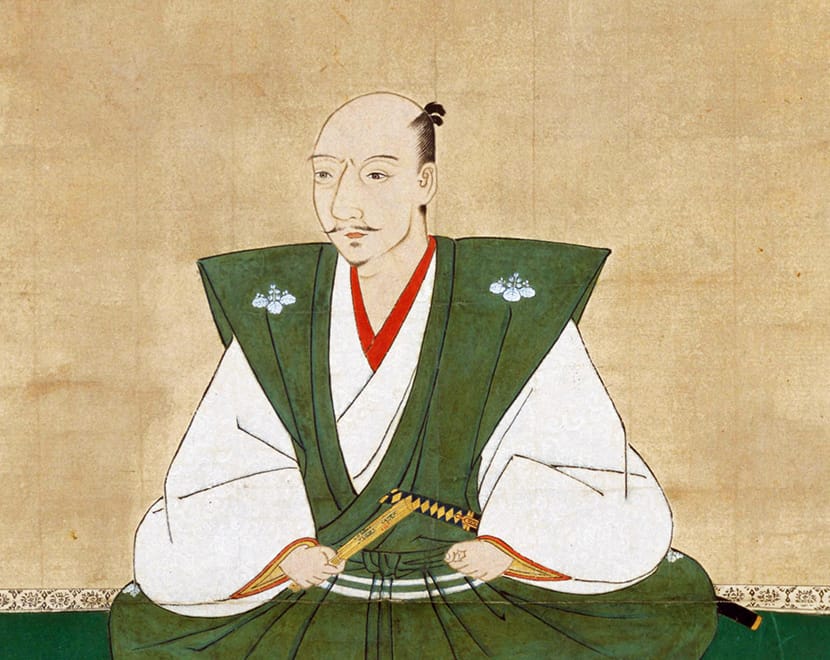
Music Notes
This piece held special meaning for YAMAZAKI Kyokusui, the second artistic leader (sōhan) of the Tachibanakai. It was the first piece TACHIBANA Kyokusō (1892-1971), the founder of Tachibanakai, taught the 17-year-old biwa player YAMAZAKI Kyokusui in 1923.
Kyokusō’s choice is astonishing, because the work is in many respects highly demanding for a player who was not yet very experienced.
It is long with 133 lines, has intricate variations of several nagashi-passages and contains an impressive display of instrumental patterns with a wide range of expression.
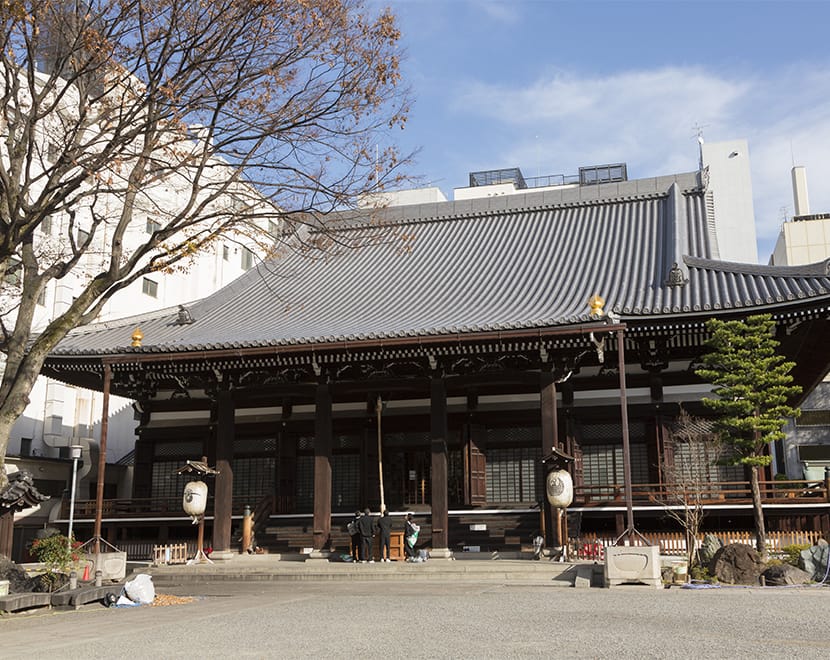
In the center of the tale is a shigin – which is a Chinese poem (kanshi) of eight lines (usually there are not more than four kanshi-lines inserted into a biwa-ballad). This kanshi – written by the well-known poet and historian RAI San’yō – is famous. It poses here, however, a challenge for the singer. biwa performers may not just sing this shigin in a beautiful melodious way which is the principal stylistic requirement of performing of a shigin, but must adhere to the basic ideal of biwa-recitation: transmitting the meaning of a text. This problem affects especially line 70.
”but raising his whip and pointing to the East”,
where the turning point of the whole story is presented. Mitsuhide expresses in this line his hidden intention through an unmistakably clear gesture. A pleasant delivery fails to convey the importance of this passage.
